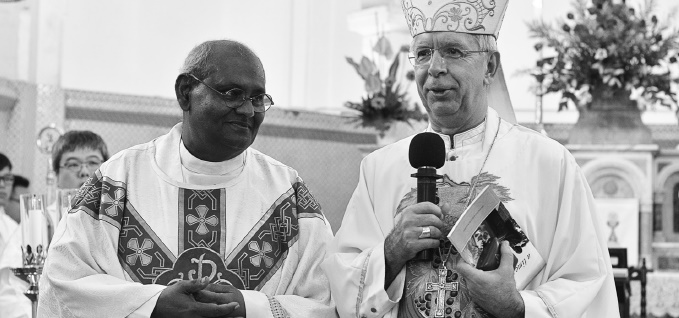“Every time you establish a presence in a district, something good happens.”
This was the key disclosure of Papal Nuncio Archbishop Joseph Marino to 500 parishioners at the parish hall of the Church of the Immaculate Conception (CIC), August 15.
Archbishop Marino was speaking on the topic of the New Evangelisation in this age.
“I was invited to an official reception to celebrate Eid, the Muslim feast that follows the conclusion of Ramadan,” he recalled of his tour of duty in overwhelmingly Muslim Bangladesh.
“A gentleman came up to me and implored that my Church should open up a place of worship in every district in his country. I asked him why he wanted my Church to do so when we just have only 350,000 Catholics among a 160-million population.
He said, “Because, everywhere you open up a place, something good happens,” said Archbishop Marino. The crowd burst into applause.
The Papal envoy cited this in support of his point that Catholics have merely to live their faith, particularly in the teeth of adversity, in order to evangelise amongst the multiracial and multi-religious milieu they find themselves in in Asia.
Continuing his talk, Archbishop Marino said the Holy Father tells us that the entire proclamation of Jesus comes “from the heart of the Gospel.”
He said only by proclaiming and speaking from the heart of the Gospel will we be able to announce that which is of primary importance. The primary reason for evangelising is the love of Jesus which we have received, the experience of salvation which urges us to ever greater love of him.
Therefore, the Nuncio said, the essential and primary proclamation, coming from the heart of the Gospel itself, is the love and mercy that Christ has given to us which, in turn, we are compelled to announce to others.
He said, “To evangelise, then, is to introduce others to a person whom we, the evangeliser, believes to be the centre of our lives.” To proclaim “from the heart of the Gospel,” he said, leads to a true missionary style of proclamation which must not be “obsessed with the disjointed transmission of a multitude of doctrines to be insistently imposed.
Instead, the Nuncio explained, “The missionary way of proclaiming is to reach everyone without exception or exclusion. That can only be done, affirms the Holy Father, if we concentrate on the essentials, on what is most beautiful, most grand, most appealing and, at the same time, most necessary. Consequently, it becomes all the more forceful and convincing.”
He said, “As Church, we are a people advancing ourselves towards the mystery of salvation, transcending any institutional expression, even if necessary.”
He went on to say that we must recognise that if part of our baptised people lack a sense of belonging to the Church, this is also due to certain structures and the occasionally unwelcoming atmosphere of some of our parishes and communities or to a bureaucratic way of dealing with problems, be they simple or complex, in the lives of our people.
The Nuncio critiques parish structures and affirms, “We must admit that the call to view and review our parishes has not yet sufficed to bring them nearer to people, to make them environments of living communion and participation, and to make them completely mission-oriented.”
The Nuncio said, that in addressing the realities of basic Christian communities and ecclesial movements, the Holy Father, while recognising them as a source of enrichment for the Church, explains that they would be more beneficial if they do not “lose contact with the rich reality of the local parish” and that in that way, they will be prevented from concentrating only on part of the Gospel or the Church.
He called on the people to be evangelised and to be disciples, that is, followers of Christ but, at the same time, we are evangelisers. As such, he says, we are missionary disciples, adding that “Every Christian is a missionary to the extent that he or she has encountered the love of God in Christ.”
Only then will we be able to say, like countless men and women in the Scriptures, “we have found the Christ.”
He added that, to be evangelisers is to bring to others what we have received, God’s love and mercy, God’s tenderness and forgiveness.
“It means to open doors, build bridges and embrace those who are lost and misdirected, confused and alienated. It means to be convinced that at the table of the Lord, there is a place for everyone.”
Article reproduced from Herald Malaysia online
 Cross Hanging 31cm
5 × RM 20.50
Cross Hanging 31cm
5 × RM 20.50  Benedict Cross 5421
4 × RM 4.80
Benedict Cross 5421
4 × RM 4.80  Miraculous Blue Medal
10 × RM 3.00
Miraculous Blue Medal
10 × RM 3.00  Rosary Jet
1 × RM 39.50
Rosary Jet
1 × RM 39.50  Plaque Lady Of Grace
6 × RM 8.50
Plaque Lady Of Grace
6 × RM 8.50  Car Rosary AM
4 × RM 10.50
Car Rosary AM
4 × RM 10.50  Kristus
10 × RM 9.50
Kristus
10 × RM 9.50  Yesus Cinta Saya
10 × RM 9.50
Yesus Cinta Saya
10 × RM 9.50  Cross Luminous 0569
8 × RM 3.80
Cross Luminous 0569
8 × RM 3.80  Medallion Crucifix 5309
14 × RM 3.80
Medallion Crucifix 5309
14 × RM 3.80  Plaque Mary(Oval)
4 × RM 10.50
Plaque Mary(Oval)
4 × RM 10.50  Plaque Mary With Baby Jesus (Oval)
2 × RM 10.50
Plaque Mary With Baby Jesus (Oval)
2 × RM 10.50  Benedict Hanging Crucifix II 18.5 cm
2 × RM 14.00
Benedict Hanging Crucifix II 18.5 cm
2 × RM 14.00  Cross Luminous 0532
10 × RM 3.80
Cross Luminous 0532
10 × RM 3.80  Gold Rose Crucifix 12 cm
6 × RM 23.00
Gold Rose Crucifix 12 cm
6 × RM 23.00  Medallion Crucifix 5422
4 × RM 3.00
Medallion Crucifix 5422
4 × RM 3.00  Plaque Jesus (3D)
6 × RM 9.80
Plaque Jesus (3D)
6 × RM 9.80  SH of Jesus 30 cm
2 × RM 78.80
SH of Jesus 30 cm
2 × RM 78.80 
 Cross Hanging 31cm
Cross Hanging 31cm  Benedict Cross 5421
Benedict Cross 5421  Miraculous Blue Medal
Miraculous Blue Medal  Rosary Jet
Rosary Jet  Plaque Lady Of Grace
Plaque Lady Of Grace  Car Rosary AM
Car Rosary AM  Kristus
Kristus  Yesus Cinta Saya
Yesus Cinta Saya  Cross Luminous 0569
Cross Luminous 0569  Medallion Crucifix 5309
Medallion Crucifix 5309  Plaque Mary(Oval)
Plaque Mary(Oval)  Plaque Mary With Baby Jesus (Oval)
Plaque Mary With Baby Jesus (Oval)  Benedict Hanging Crucifix II 18.5 cm
Benedict Hanging Crucifix II 18.5 cm  Cross Luminous 0532
Cross Luminous 0532  Gold Rose Crucifix 12 cm
Gold Rose Crucifix 12 cm  Medallion Crucifix 5422
Medallion Crucifix 5422  Plaque Jesus (3D)
Plaque Jesus (3D)  SH of Jesus 30 cm
SH of Jesus 30 cm 
